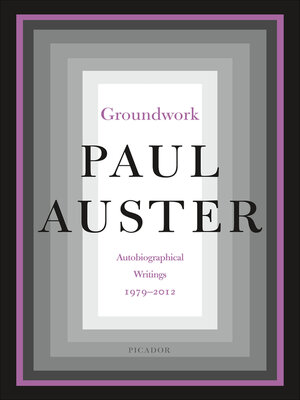
Sign up to save your library
With an OverDrive account, you can save your favorite libraries for at-a-glance information about availability. Find out more about OverDrive accounts.
Find this title in Libby, the library reading app by OverDrive.



Search for a digital library with this title
Title found at these libraries:
| Library Name | Distance |
|---|---|
| Loading... |
A collection of autobiographical nonfiction, including the memoir The Invention of Solitude, by the Booker Prize finalist and “literary original” (The Wall Street Journal).
Paul Auster spent his decades-long writing career examining what it means to be truly alive. For the first time, in this self-curated collection, he stitches together various autobiographical writings to lay bare the trajectory of both his personal life and sense of self.
From his breakout memoir, The Invention of Solitude, which solidified Auster’s reputation as a canonical voice in American letters, to excerpts from his later memoirs, Winter Journal and Report from the Interior, readers are ushered into the inner workings of Auster’s self-development. His sweeping recollection winds through the halls of Columbia University during the turbulent 1960s and into life as a young poet-turned-novelist, journeys into the past via newspaper clippings about a century-old murder case in his family, and dives headfirst into the realities that accompany aging today. Along the way, Auster continually challenges the notion of what autobiography can be, inverting the form through fragmentation and, ultimately, illustrating firsthand the brilliance behind “one of the great writers of our time” (San Francisco Chronicle).
Paul Auster spent his decades-long writing career examining what it means to be truly alive. For the first time, in this self-curated collection, he stitches together various autobiographical writings to lay bare the trajectory of both his personal life and sense of self.
From his breakout memoir, The Invention of Solitude, which solidified Auster’s reputation as a canonical voice in American letters, to excerpts from his later memoirs, Winter Journal and Report from the Interior, readers are ushered into the inner workings of Auster’s self-development. His sweeping recollection winds through the halls of Columbia University during the turbulent 1960s and into life as a young poet-turned-novelist, journeys into the past via newspaper clippings about a century-old murder case in his family, and dives headfirst into the realities that accompany aging today. Along the way, Auster continually challenges the notion of what autobiography can be, inverting the form through fragmentation and, ultimately, illustrating firsthand the brilliance behind “one of the great writers of our time” (San Francisco Chronicle).






